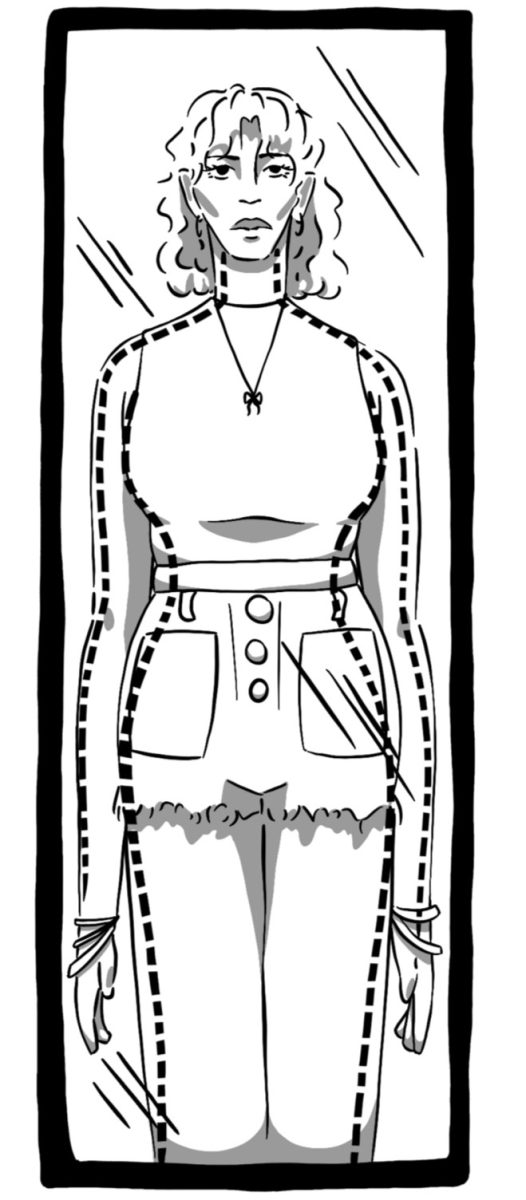The beach body is a misguided ideal that has haunted people of all ages for years. Whether coating oneself in self-tanner or attempting weight loss, the concept of a summer body affects the habits of nearly everyone.
“There should not be any sort of body dictated by a season because that just infers it’s a body that looks ‘good’ when exposed in the summer,” said Zoë Weber, a senior at Ida B. Wells High School.
The reality is that no one holds the right to decide what bodies are desirable and to casually tell thousands in a TikTok or Instagram Reel that they need to alter themselves to exist outside is false and unnecessary.
“What I think is interesting about posts encouraging people to work on their summer body is that it’s not encouraging people to work on their physical fitness. It’s encouraging people to try and change themselves to fit some other standard of what they think they should be whether it’s achievable for them at all or not,” said Ian Lafrenz, a senior at IBW.
Too often being in a smaller body and being healthy are seen as synonymous which is inaccurate. This impacts how people are treated from personal relationships to medical care, particularly when it comes to Body Mass Index (BMI).
According to NBC News, BMI alone is not a reliable indicator of health due to the inability to account for differences in race and gender. The BMI calculations were originally developed in the 1830s based on the heights and weights of white men meaning that using it as a method to determine health is outdated and exclusionary. Not to mention that BMI does not account for muscle mass.
The inaccuracies in BMI contribute to weight stigma which affects medical care. According to Forbes, providers who show signs of weight bias are less likely to perform mammograms and cancer screenings on patients with higher BMIs.
No one is rewarded for pursuing health unless it directly leads to physical results that leave them appearing smaller.
“When someone loses a bunch of weight, everyone is very quick to congratulate that person for all the effort they put in. Other people put in the same amount of effort but because their body is different that effort isn’t always recognized,” said Lafrenz.
Why does this happen? First, it’s important to recognize that Western society does not prioritize health, but thinness. It’s seen in the lack of clothing size options and workplace discrimination. According to a 2023 NPR article, women who weigh more tend to earn less and are less likely to receive raises or promotions.
Additionally, society has taught people that being concerned for someone’s health is a sign of virtue and that weight gain is a moral issue.
However, being at an average weight or being healthy (it should be noted that those are different) is not a requirement for deserving love or respect. The constant phrasing of, “as long as you’re healthy,” in the comment sections of plus-size content creators is just a different way of saying, “I get to decide to treat you kindly or not.”
“What a lot of people don’t understand is that body positivity is not against encouraging people to improve themselves and engage in fitness. It’s about not writing someone off because of the person they are regardless of what they’re doing to improve themselves,” said Lafrenz.
Some helpful tips for bad body image days include staying off social media and wearing clothes that don’t make you think about your body.
However, in some ways, social media can be helpful when learning about body confidence.
“I specifically try to only look at social media stuff that is body positive,” said Sunny Press, a sophomore at IBW.
Bay Area-based content creator, Kaitlyn Moore known on Instagram and TikTok as @sass.and.cellulite creates all sorts of videos for those learning to be comfortable in their body from her series “Does it XL?” where she determines if clothes bought online fit a size 16-18 body to episodes titled “5 ways to make the dressing room experience suck less” on her podcast titled A Dose of Sass.
One of her most viral videos is one that received the widest variety of reactions from commenters who related to those who made judgments about her body. “I filmed a video of myself in a green skirt that fit differently than I expected. I don’t usually catch that on camera but I didn’t try it on before filming,” said Moore. In the video, she is seen working through a negative body image moment which is rarely seen on social media. The caption on the Reel read “This is what my stomach looks like in this skirt – it’s allowed. I don’t love it – and that’s allowed too.” Content like this helps remind social media users that no one is confident in their body at all times and there are healthy ways to get through bad body image moments.
“Body image doesn’t have to do with your body, it’s about your brain,” said Moore.
Body changes will not lead to the euphoric self-confidence you see in ads for weight loss supplements. Learning to accept your current body and how it may change in the future will help put things in perspective.
“Take a step back and remember that you are a human being and that your body is there to keep you alive and keep you healthy,” said Weber.
Here’s your reminder that body and weight changes are not acceptable attributes to comment on in the summer — or any time of the year. Those changes are not a moral failing or something that should impact the way others treat you.
Lafrenz said it best, “You are immediately searching for things you dislike about yourself. That’s not what everyone else is doing. If they’re a kind and reasonable person they just want to know you and be around you.”















